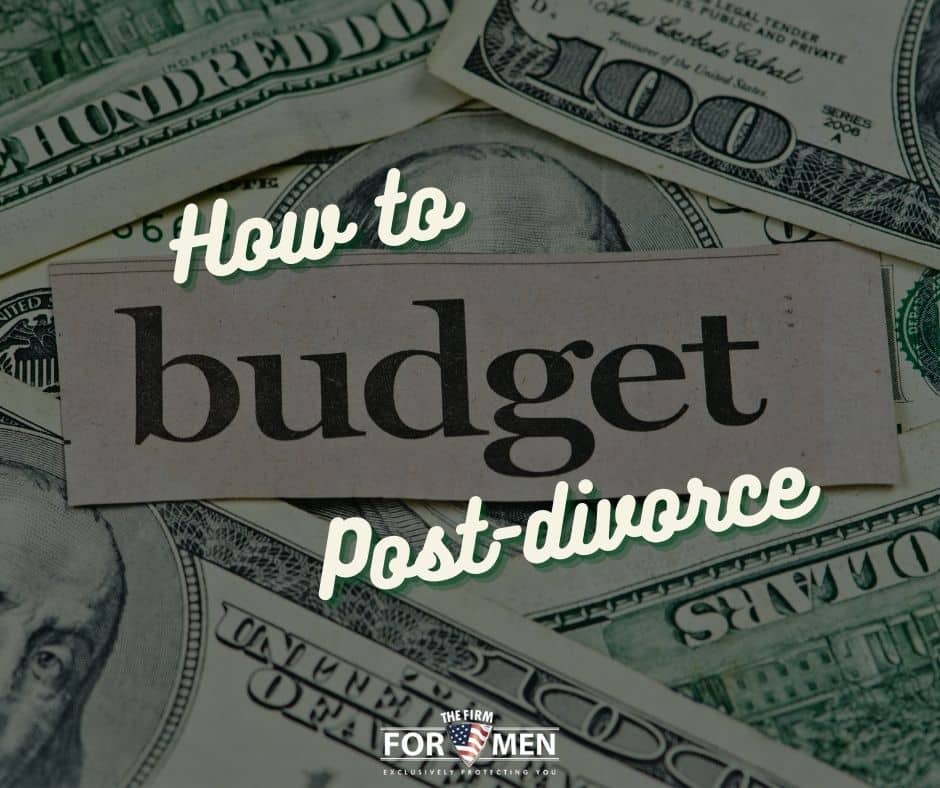You are free, free, free! After divorce, embrace that heady feeling of being on your own again. You’re free to set your own schedule, free to eat what you want, free to go where you like. Don’t worry about getting too cocky. Real life will intrude. The car loan must be paid, rent or mortgage is due every month, and your grocery bill is always higher than you anticipate. How should you budget after divorce?
First Step: A Notepad and Some Envelopes
You can begin by going Old School. Stock up on a writing tablet (you know, pen on paper, not a Kindle) and business envelopes. You also need to know your monthly income.
On the paper tablet, write down all your monthly expenses and recurring debts (accountants call them expenses or liabilities), like this:
- Gasoline credit card
- Continuing education classes at UVA
- Tiny Tina’s Tequila Tavern bar tab
- Bank card (unsecured credit card)
- Medical bills
- Dominion Energy, Verizon telephone, and other utilities
- The Firm For Men’s reasonable, modest invoice
- Wiggly Giggly groceries
- Rent or mortgage payment
- Life insurance, automobile insurance, liability insurance, umbrella insurance, disability insurance, pet insurance, long-term care insurance, alien abduction insurance …
- Lonesome Doves Feathered Friends Pet Shop
- Car payment or commuting charges
- Your monthly membership fee for Big Bill’s Breakfast Bagels & Fill Dirt Emporium
Don’t worry if you miss something; the friendly USPS carrier or your internet provider will surely deliver more.
For each item, jot down the typical monthly expense on the far right of the tablet. Add up your monthly expenses. If your expenses are greater than your income, you have a budget problem. But it is solvable!
Label all your envelopes, one envelope for each expense. Separate the envelopes into three piles:
- Discretionary—These are the first things to reduce; pets are expensive to buy and maintain; drinking socially costs you money and health; how much fill dirt can one man use?
- Autopay—These expenses may automatically charge to a credit card; scan your credit card statement and suspend or cancel all automatic charges, such as subscription streaming services, gym membership, and charities
- Fixed and Necessary Expenses—You pay these or else you end up hungry, naked, and homeless; you may be able to negotiate smaller monthly bites on your car payment (by extending the term or refinancing), medical bills (by talking to the provider’s billing department), or groceries (by buying store brands and, yes, using coupons)
For every paycheck from now until you get your finances in order, cash the paycheck and tuck the necessary money into every envelope.
- Start by “paying” your fixed and necessary expenses into their envelopes
- You are not allowed to “pay” discretionary expenses until you get your budget under control
- Pay those previously automatic charges with care, picking and choosing which are truly meaningful and which are just bad spending habits
This method forces you to identify where you can tighten your budget even more, if an envelope has leftover cash at the end of the month.
There’s An App For That
Keeping track of the dimes and dollars is easier when you use a smartphone app:
- Expensify (free)—For business owners; scan receipts, track reimbursements for business expenses, keep on eye on corporate credit cards, all in a single app
- Koho (basic is free; premium is $9/month)—The app says you can “budget, spend and save money toward your financial goals while earning rewards with their prepaid payment card;” it has a free and premium version
- Mint (free)—Mint reaches out to all your online accounts and tracks spending, saving, goals, and more
- PocketGuard (basic is free; better is $3.99/month)—PocketGuard helps users spend less than they earn; see how much money you have left after setting aside enough for bills; organize your bills, customize your budget the way you want
More Money Than Month
The old chestnut is that you run out of money before you run out of month. After a divorce, you have far fewer safety nets to get you through to the 30th or 31st (yes, yes, February, we hear ya; the 28th, too).
Experts at MiddleClassDadMoney advise freezing any elective savings plans you may have had in place before divorcing:
- Children’s college fund—Parents are not legally required to pay for their children’s higher education; it’s lovely and generous if you can, but if you can’t, you can’t
- Retirement funds—You may be able to reduce your contributions to your employer-directed retirement account, at least temporarily (return to it after your finances are solid)
- Savings—If you have even a mere two-month emergency fund in a savings account, you can survive; stop tucking away more money for a rainy day when you are in a heavy downpour now
Your marriage may have masked more than just emotional challenges. Too many couples juggle both incomes to get through to the next pay cycle. With only your income, you can no longer use your ex-spouse’s income to limp through to another paycheck. You need to:
- Plan and follow a budget
- Analyze your use of credit—avoid depending on credit cards to fill gaps between paychecks
- Be conscious of your frivolous spending—stop buying gifts when greeting cards will do; stop going on weekend trips you cannot afford; call your relatives at the holidays instead of sending fruit baskets
One of the best uses of your money is to contact us today at The Firm For Men and engage us as your family law attorneys. Receive zealous defense, wise counsel, and compassionate attention to your separation and divorce. You may also call us at (757) 383-9184 to schedule a consultation.

